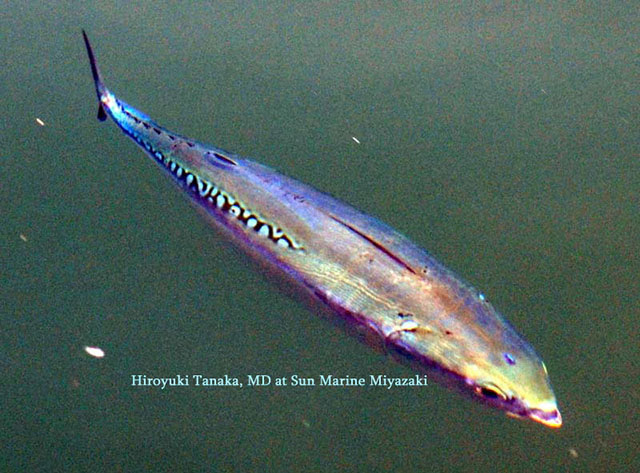| Scombridae (Mackerels, tunas, bonitos), subfamily: Scombrinae |
| 50 cm FL (male/unsexed); max. reported age: 5 years |
|
pelagic-neritic; brackish; marine; depth range - 10 m, oceanodromous |
| Atlantic, Indian and Pacific (Western): including the Mediterranean Sea. The eastern Pacific population is recognized as subspecies Auxis rochei eudorax (Ref. 32349). Highly migratory species. |
|
Dorsal spines (total): 9-12; Dorsal soft rays (total): 10-13; Anal spines: 0-0; Anal soft rays: 12-14. Back bluish, turning to deep purple or almost black on head. Scaleless area with pattern of 15 or more fairly broad, nearly vertical dark bars. Belly white. Pectoral and pelvic fins purple, their inner sides black. Body robust, elongate and rounded. Teeth small and conical, in a single series. Pectoral fins short, not reaching vertical line from anterior margin of scaleless area above corselet. A large, single-pointed flap (interpelvic process) between pelvic fins. Body naked except for corselet, which is well developed in its posterior part 9 more than 6 scales wide under second dorsal-fin origin). A strong central keel on each side of caudal-fin base between 2 smaller keels (Ref 9684). |
| Adults are principally caught in coastal waters and around islands (Ref. 9340). Form schools. Feed on small fishes, particularly anchovies, crustaceans (especially crab and stomatopod larvae) and squids. Eggs and larvae are pelagic (Ref. 6769). Because of their abundance, they are considered an important element of the food web, particularly as forage for other species of commercial interest. Also caught with encircling nets and troll lines (Ref. 9340). Marketed fresh and frozen (Ref. 9340) and also dried or salted, smoked and canned (Ref. 9987). |
|
Least Concern (LC); Date assessed: 01 March 2022 Ref. (130435)
|
| harmless |
Source and more info: www.fishbase.org. For personal, classroom, and other internal use only. Not for publication.
